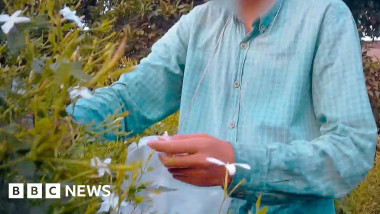Luxury perfumes linked to child labour, BBC finds
Children have picked ingredients used by suppliers to two major beauty companies, the BBC can reveal.
A BBC investigation into last summer’s perfume supply chains found jasmine used by Lancôme and Aerin Beauty’s suppliers was picked by minors.
All the luxury perfume brands claim to have zero tolerance on child labour.
L’Oréal, Lancôme’s owner, said it was committed to respecting human rights. Estée Lauder, Aerin Beauty’s owner, said it had contacted its suppliers.
The jasmine used in Lancôme Idôle L’Intense - and Ikat Jasmine and Limone Di Sicilia for Aerin Beauty - comes from Egypt, which produces about half the world’s supply of jasmine flowers - a key perfume ingredient.
Industry insiders told us the handful of companies that own many luxury brands are squeezing budgets, resulting in very low pay. Egyptian jasmine pickers say this forces them to involve their children.
